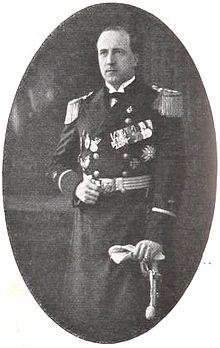Georg Enoch Freiherr von und zu Guttenberg
Georg Enoch Freiherr von und zu Guttenberg (born November 10, 1893 in Würzburg ; † December 21, 1940 there ) was a member of the First Chamber of the Bavarian State Parliament , the Chamber of Imperial Councils .
family
Freiherr von Guttenberg belonged to the Frankish noble family of Guttenberg family , which in 1700 by Leopold I was elevated to the realm baron.
Guttenberg's parents were Karl-Theodor Freiherr von und zu Guttenberg (1854–1904) and Maria Countess von Rotenhan (1860–1945), they married in 1888. Guttenberg had three siblings: Maximilian (1889–1914), Elisabeth (1891–1946 ), who married Clemens Schenk Graf von Stauffenberg in 1911, and Karl Ludwig (1902–1945), resistance fighter in the Third Reich.
Guttenberg married Elisabeth Freiin von und zu der Tann-Rathsamhausen (1900–1998) in 1919 . They had four children: Philipp Franz (1920–1943), Karl Theodor (1921–1972; he was Parliamentary State Secretary and Member of the German Bundestag ), Maria Nives (* 1925) and Therese (1929–1953), who worked with the architect Alexander was married by Branca .
One of his grandchildren is the conductor Enoch zu Guttenberg , one of his great-grandchildren is the former Federal Minister Karl-Theodor zu Guttenberg .
biography
After the death of his brother Maximilian in 1915 Guttenberg took his place in the Chamber of Reichsräte , which he held until the end of the war in 1918. According to the protocol, Guttenberg was the youngest Reichsrat to sit next to the oldest, Franz von Buhl , who, as he had no heirs himself, bequeathed his estate in Deidesheim , the Reichsrat von Buhl winery , one of the largest in Germany at the time.
During the First World War Guttenberg was an imperial naval officer on the battleship Großer Kurfürst , where he witnessed the Battle of the Skagerrak . After the war he campaigned for the reintroduction of the monarchy in Bavaria, was involved with other officers in the suppression of the Bavarian Soviet Republic in 1919 and took part in the Kapp Putsch in 1920 . Guttenberg was also a member of the right-wing aristocratic-bourgeois interest group Gäa .
From 1927 to 1933 Guttenberg was the head of the Bavarian Homeland and Royal League and in 1933 was involved in the preparations for the planned takeover of power by Crown Prince Rupprecht . After the Röhm putsch in 1934, he was temporarily arrested as part of the actions against Röhm . In 1939 he resumed his service with the Navy and was appointed commander of the luxury ship Europa , which was to be used in the planned invasion of England . In 1940, the Europa, which lay in front of Bremerhaven, was hit by a British aerial bomb and Guttenberg was wounded in the process. He died a short time later in a hospital in Würzburg.
literature
- Manfred Berger : Georg Enoch Freiherr von und zu Guttenberg. In: Biographisch-Bibliographisches Kirchenlexikon (BBKL). Volume 23, Bautz, Nordhausen 2004, ISBN 3-88309-155-3 , Sp. 599-604.
- Elisabeth zu Guttenberg : called by name - memories. Ullstein Verlag, Berlin 1993, ISBN 3-548-23260-4 .
Web links
- Georg Enoch Freiherr von und zu Guttenberg in the parliamentary database at the House of Bavarian History
Footnotes
- ^ Elisabeth zu Guttenberg: Called by Name - Memories. Ullstein Verlag, Berlin 1993, ISBN 3-548-23260-4 , p. 286: Family table of the barons von and zu Guttenberg.
- ↑ a b c Georg Enoch Freiherr von und zu Guttenberg in the parliamentary database at the House of Bavarian History , accessed on March 5, 2009.
- ^ Elisabeth zu Guttenberg: Called by Name - Memories. Ullstein Verlag, Berlin 1993, ISBN 3-548-23260-4 , p. 56.
- ^ Elisabeth zu Guttenberg: Called by Name - Memories. Ullstein Verlag, Berlin 1993, ISBN 3-548-23260-4 , p. 149 f.
| personal data | |
|---|---|
| SURNAME | Guttenberg, Georg Enoch Freiherr von und zu |
| BRIEF DESCRIPTION | Member of the Bavarian Imperial Council |
| DATE OF BIRTH | November 10, 1893 |
| PLACE OF BIRTH | Wurzburg |
| DATE OF DEATH | December 21, 1940 |
| Place of death | Wurzburg |
